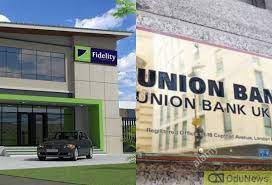As part of its strategy for worldwide development, Fidelity Bank Plc has successfully completed the acquisition of Union Bank UK (UBUK), which was a subsidiary of Union Bank of Nigeria Plc.
The acquisition of Union Bank UK, which was approved by the Prudential Regulatory Authority of the Bank of England, is anticipated to release a considerable amount of value for the Fidelity Bank Group, as stated by the board of directors of the bank, which oversaw the transaction.
The Central Bank of Nigeria (CBN) had previously sent Fidelity Bank a letter indicating that it had no objections about the transaction.
“The acquisition of UBUK is in furtherance of Fidelity Bank Plc’s strategic initiatives on international expansion,” the bank said in the statement.
In the meantime, the shareholders of Fidelity Bank Plc would be entitled to an interim dividend payment of 25 kobo per share, which will total N8 billion for the half-year financial period that concluded on June 30, 2023.
The bank increased its gross earnings by 59.6% to N247.1 billion during the first half of the year, which was driven by a growth of 39.4% in its interest income and a growth of 207.2% in its non-interest revenue. The dividend payment is a testament to the bank’s good financial performance during this period of the year.
The total deposits held by customers at the bank surpassed the N3 trillion milestone, showing a year-to-date growth of 23.2% to reach N3.2 trillion. This compares to client deposits of N2.6 trillion held throughout the 2022 fiscal year.
Read also: Fidelity Bank showcases financing opportunities for Nigeria’s fintech
Comments from the CEO of Fidelity Bank
Nneka Onyeali-Ikpe, the Managing Director and Chief Executive Officer of Fidelity Bank Plc, made the following statement in response to questions on the performance of the bank:
“We are pleased to report on another period of quality growth across all financial and non-financial indices.
“Our performance during the first half of the year reflects the resilience of our bank and the fundamental strength of our business to deliver long-term sustainable value at a time that has been characterised by global economic headwinds.
“As a bank, we remain committed to our goal of helping individuals to grow, inspiring businesses to thrive and empowering economies to prosper.”
Union Bank Plc, which has also been bought by Titan Trust Bank, said the divestiture of UBUK was to enable it to focus on its core banking operations in Nigeria.
About Fidelity bank
Fidelity Bank is a full-fledged commercial bank that operates in Nigeria. The bank has over 5 million customers, all of whom are served across its 250 business branches as well as numerous additional digital banking platforms.
Fidelity Bank is rapidly implementing a digital-based retail banking strategy. This strategy has resulted in exponential growth in savings deposits over the last 12 years, with over 57 percent of customer enrollment on the Bank’s flagship mobile/internet banking products. Fidelity Bank focuses on select niche corporate banking sectors as well as Micro Small and Medium Enterprises (MSMEs).
Fidelity Bank Plc first opened its doors in 1988 as a Merchant Bank. The company is currently listed on the Nigerian Stock Exchange (NSE). It changed its business model to commercial banking in 1999, and then in February of 2001, it became a universal bank. The new, larger Fidelity Bank is the product of a merger that took place in 2005 between the institution that was formerly known as FSB International Bank Plc and Manny Bank Plc.
About Union bank
Union Bank of Nigeria Plc is a business bank with its main office in Lagos, Nigeria. Since 1917, it has been running in Nigeria.
It is one of the oldest and most recognised financial institutions in Nigeria. It offers a wide range of banking services to individuals, small and medium-sized businesses (SMEs), commercial clients, and large corporations.




